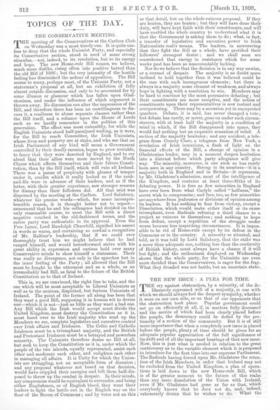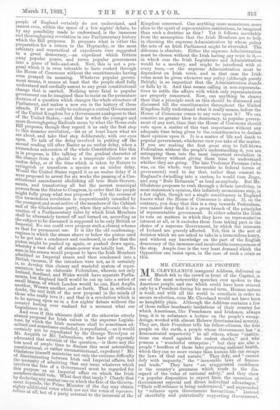THE NEW ISSUE: A PLEA FOR TIME. T HE cry against
obstruction, by a minority, of the de- liberately expressed will of a majority, is one with which we should always feel the deepest sympathy, whether it were on our own side, or on that of our opponents that the obstruction took place. Popular government could not go on efficiently at all, if, in matters fully discussed and the merits of which had been clearly placed before the people, the democracy could be defied by the per- tinacity of a section of the community. But it is of still more importance that when a completely new issue is placed before the people, plenty of time should be given for an adequate popular appreciation of the full significance of its drift and of all the important bearings of that new issue. Now, this is just what is needed in relation to the great controversy as to the variable element which it is proposed to introduce for the first time into our supreme Parliament. The Radicals having forced upon Mr. Gladstone the reten- tion of the Irish Members, in order that Ireland may not be excluded from the United Kingdom, a plan of opera- tions is laid down in the new Home-rule Bill, which is of far greater moment to the future of this realm than any mere dissolution of the Union with Ireland, even if Mr. Gladstone had gone as far as that, which everybody knows that he does not do, and, indeed, vehemently denies that he wishes to do. What the people of England certainly do not understand, and cannot even, within the space of a few nights' debate, be by any possibility made to understand, is the immense and thoroughgoing revolution in our Parliamentary history which the Bill proposes. It proposes what is either the preparation for a return to the Heptarchy, or the most arbitrary and unpractical of expedients ever suggested to a great democracy,—an expedient which fritters away popular power, and turns popular government into a game of hide-and-seek. Now, this is not a pro- posal which it is even tolerable to have rushed through the House of Commons without the constituencies having even grasped its meaning. Whatever popular govern- ment means, it means at least that the people shall fully understand and cordially assent to any great constitutional change that is carried. Nothing more fatal to popular government can be imagined than to insist on the premature decision of a question which changes the whole structure of Parliament, and makes a new era in the history of these islands. If we are really to exchange a central Government of the United Kingdom for a. Government analogous to that of the United States,—and that is what the younger and more thoroughgoing Radicals mean by what the Home-rule Bill proposes, though they regard it as only the first step to this monster revolution,—let us at least know what we are about, and take that step deliberately, with our eyes Open. To talk of the delay involved in putting off the second reading till after Easter as an undue delay, when a tremendous subversion of the whole Constitution like this is in iprogress, is like talking of the gradual character of the change from a glacial to a temperate climate as an undue delay, or of the time which is taken by Nature to extinguish or transform a species as an undue delay. Would the United States regard it as an undue delay if it were proposed to arrest for six weeks the passing of a Con- stitutional amendment abolishing all true State Govern- ments, and transferring all but the merest municipal Powers from the States to Congress, in order that the people might fully grasp what was proposed ? Yet the reverse of this tremendous revolution is unquestionably intended by the youngest and most active of the members of the Cabinet and of the Gladstonia,n party, when they advocate the in- vention of a. Parliamentary valve by which Irish Members shall be alternately turned off and turned on, according as the subject to be discussed is supposed to be only British or Imperial. No one could ever propose such a clumsy scheme as that for permanent use. It is like the old condensing- engines in which the steam above or below the piston used to be got into a condenser and condensed, in order that the Piston might be pushed up again, or pushed down again, whereby a vast deal of steam-power was totally lost. No m9,11 in his senses would propose to have the Irish Members . itted as Imperial steam and then condensed into a British vacuum, if the intention were not, as it certainly Ise; to develop this clumsy and wasteful system of repro- into an elaborate Federalism, wherein not only menatnci, Scotland, and Wales would have separate Parlia- sm,%but England itself would be cut up into a series of another, Wessex anoTh °tat a which London would be one, East Anglia another, and so forth. That is, without a doubt the real drift of the new proposal in the minds of those to be who really love it ; and that is a revolution which is countrsprung having upon us in a few nights' debate without the Le ' gis a ure s at. ever realised for a moment what our absurd even if this ultimate drift of the otherwise utterly tire, bdyPwrohpiochsalthfe for Irish valves in the supreme Legisla. ad- mitted and sometimes excluded,members shall be sometimes ad- certainly not be re" ex' eluded, is repudiated,—as it would Mr. Asquith or Mrputatred by Sir George Trevelyan or advocated that solution abionehe're, who have all expressly less need of ample timeot the question,—is there any the constitutional, or rather line 'scum this most astounding Gladstone himself maintain onstitutional, expedient? Mr. of discriminating between maintains not onl the extreme difficulty the necessity of admitting that any an Imperial affairs, but at itny issue whatever which involves the fate of a Government must be regarded for this purpose as an Imphertiaal affair on which the Irish members should vote. 'W's does that imply ? Clearly that by declaring any matter oneao.n.w which the fate of the Govern- ment depends, the Prime M. hinister of the day may obtain eighty additional votes whit are not the votes of represen- tatives at all, but of a party external to the interests of the Kingdom concerned. Can anything more monstrous, more alien to the spirit of representative institutions, be imagined than such a doctrine as this ? Yet it follows inevitably from the assumption that the Irish Members are to help in choosing the supreme Administration by whose policy the acts of an Irish Parliament might be overruled. The dilemma is absolute. Either the supreme Administration must be chosen without the Irish having any voice in it,— in which case the Irish Legislature and Administration. would be a mockery, and might be interfered with at every turn,—or the supreme Administration must be dependent on Irish votes, and in that case the Irish votes must be given whenever any policy (although purely British) is so important that the Administration stands or falls by it. And that means calling in non-representa- tives to settle the affairs with which only representatives are properly concerned. Now, can anything be clearer than that a principle such as this should be discussed and discussed till the constituencies throughout the United Kingdom fully understand what it really means, before the House of Commons comes to any vote upon it ? We can conceive no greater blow to democracy, to popular govern- ment of any sort, than that the House of Commons should vote upon a matter of this vast importance without any adequate time being given to the constituencies to declare their opinion upon it. It is a matter of life and death to popular government, whichever view you take of the matter. If you are making the first great step to full-blown Federalism without the people's understanding it, you are entrapping them into the most important revolution in their history without giving them time to understand whither they are going. The late Professor Freeman (who was, on the whole, very favourable to federal forms of government) used to say that, rather than consent to, England's dwindling into a canton, he would turn Jingo, and sing "Rule Britannia" as loud as anybody. But Mr. Gladstone proposes to rush through a debate involving, in most statesmen's opinion, this infinitely momentous step, in a few nights, though not a single constituency in England knows what the House of Commons is about. If, on the contrary, you deny that this is a step towards Federalism, you cannot deny that it is a, gross breach of the principles of representative government. It either admits the Irish to vote on matters in which they have no representative interest at all, or it excludes them from taking part in the choice of a supreme Government, by which the interests of Ireland are gravely affected. Yet, this is the sort of decision which we are asked to take in a tremendous hurry, and without any knowledge on the part of the English democracy of the immense and incalculable consequences of the step. Ample time is the very least demand which the Opposition can insist upon, in the case of such a crisis as this.



































 Previous page
Previous page